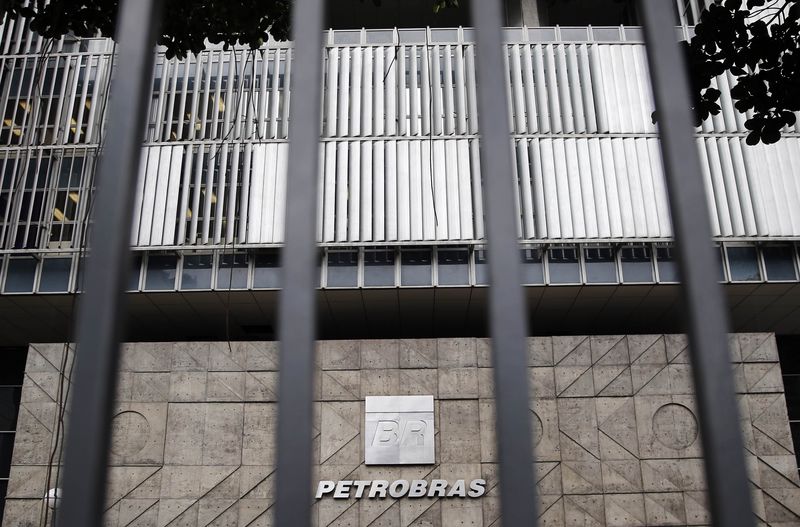By Guillermo Parra-Bernal
SAO PAULO (Reuters) - Brazil's state-controlled oil firm Petrobras may have to hike fuel prices, cut spending or seek a capital injection from the government next year as a widening corruption probe threatens to temporarily leave it out of capital markets.
Yet any of those steps would be difficult to implement and may not be enough to fully substitute international bond markets as the company's main funding source, said one banker who helped oversee some of the company's bond offerings in recent years.
Last month, Petrobras (SA:PETR4) delayed the release of third-quarter results after auditors refused to sign off on them following allegations that it systematically overpaid for assets and work by contractors.
If auditors fail to approve its annual results by April, that could trigger early repayment of as much as $11 billion of bonds and a $5.8 billion local bank loan, according to another source briefed on the situation.
To be sure, few expect Petrobras to default on its debt since it would likely negotiate a solution with bondholders and banks. But global bond investors are unlikely to participate in any new Petrobras bond offering until it provides properly audited financial information, UBS Securities and Morgan Stanley & Co analysts said in reports.
That means the company, formally known as Petróleo Brasileiro SA, may have to look elsewhere to keep funding its five-year, $220 billion investment plan, the largest in the global oil industry.
While President Dilma Rousseff could allow Petrobras to hike gasoline prices next year, she would likely resist any effort to significantly scale back the plan because it is a key part of her administration's flagship infrastructure investment program. About 68 percent of the plan's financing has already been contracted, Moody's Investors Service recently said.
"Take into account the corruption investigation, the risk perception and Petrobras' ongoing financial constraints and you see how its ability to generate cash is severely imperiled," said the banker, who requested anonymity because of the sensitivity of the issue.
The difficulties in lining up financing underpin the headwinds facing Petrobras, which only 20 months ago sold $11 billion in bonds, a record for an emerging market firm.
The corruption scandal, coupled with years of rampant debt-taking, is fanning concern that Petrobras could lose its coveted investment-grade status, driving up borrowing costs.
Touted by government officials in the last decade as the crown jewel of Brazil's economy, Petrobras has now become a symbol of the country's fall from grace. The company plans to publish unaudited results on Friday, though that is unlikely to assuage concerns about the impact of the corruption probe on operations and fundraising plans.
"I believe that no investor will buy shares or bonds with the current headline risk, at least not without the proper audited paperwork in place," said Ulisses de Oliveira, who helps manage $400 million in emerging market debt for Galloway Gestora de Recursos in São Paulo.
The refinancing hurdles loom as oil prices are tumbling, threatening to crimp revenue. Free cash flow, a measure of cash surpluses after payments to bondholders and shareholders, is expected to turn positive only by 2017, analysts estimate.
Petrobras, which declined to comment for this story, has yet to set a date to publish audited results.
If Petrobras does manage to secure fresh funding, it will come at a higher cost because of the added risks stemming from the corruption scandal.
Petrobras' 6.25 percent bond maturing in March 2024 <71647NAM1=FINR> is currently yielding close to 6.5 percent, the highest level in about a year and a half. That is in the same ballpark as issuers rated below investment grade.
OPERATION CAR WASH
The scandal is also putting pressure on Rousseff, who was chairwoman of Petrobras' board between 2003 and 2010. The probe, dubbed "Operation Car Wash," was launched in March when police began probing an alleged money laundering scheme.
New York-based law firm Wolf Popper LLP filed on Tuesday a class action lawsuit against Petrobras on behalf of investors who bought the company's U.S.-traded shares between May 2010 and November this year. The lawsuit, which alleges that Petrobras issued misleading statements that helped hide the corruption scheme, could further hamper the company's ability to access the U.S. market.
Petrobras borrows about half of its $40 billion in annual capital spending, most of that from bond investors. It typically taps bond markets early in the year, having made a first-quarter global bond offering in five of the past eight years.
Even if banks and investors in Brazil shrug off the risk of extending credit to Petrobras, local loan and bond markets are too small to supply the company with the financing it needs to undertake its projects, another banker said.
The company could still turn to state development bank BNDES [BNDES.UL] for credit, but it is unclear if the bank would extend enough money to Petrobras. Petrobras could pay for operations for about six months without tapping debt markets, executives said last month. BNDES declined to comment.
Petrobras, the world's most indebted oil firm with $140 billion in total liabilities, has $54 billion in outstanding bonds. Net debt is above the target for leverage at 2.5 times earnings before interest, tax, depreciation and amortization, and above the 35 percent of equity threshold.
"With the recent decline in crude prices, down more than 30 percent from mid-year levels, we expect lower cash generation and this will make the company more reliant on asset sales or debt to fund future development spending," Moody's said.

Shares are down about 47 percent since the investigation began gaining momentum three months ago. Chief Financial Office Almir Barbassa renewed a pledge not to sell new equity on November 17 when he outlined plans to review Petrobras accounting.
(Additional reporting by Jeb Blount in Rio de Janeiro; Editing by Todd Benson and Kieran Murray)